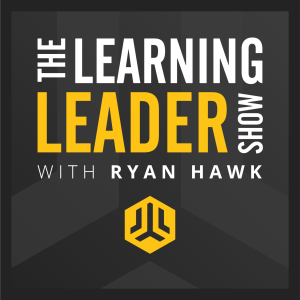
The Learning Leader Show With Ryan Hawk
Business:Management

530: Katty Kay - How Power Impacts Our Careers, Friends, & Marriages (The Power Code)
 2023-06-11
2023-06-11
Text Hawk to 66866 to become part of "Mindful Monday." Join 10's of thousands of your fellow learning leaders and receive a carefully curated email from me each Monday morning to help you start your week off right...
Full show notes at www.LearningLeader.com
Twitter/IG: @RyanHawk12 https://twitter.com/RyanHawk12
Katty Kay is a US correspondent for the BBC and a regular contributor on MSNBC. Katty grew up in the Middle East, where her father was a British diplomat. She studied French and Italian at Oxford University and worked as a foreign correspondent in Africa and Japan before moving to The US in 1996. Katty is the best-selling author of many books. Her latest is called “The Power Code.”
Notes:
- The definition of power – The ability to exercise one’s will, influence others, and effect change.
- The ability to exercise our will—More Joy. Influencing (not controlling) others—Less Ego. Effecting change—Maximum Impact.
- Redefining Power - In the past, it seems to be about dominance. About something you hold over something (people, or resources). Instead, we want it to be used to effect positive change. Let’s use power for good.
- Promoting on promise versus promoting on performance. The research states that more men are promoted on promise than women. And women are mostly promoted based on performance. As leaders, let’s think about promise versus performance. As Frank Slootman said in a previous conversation, let’s hire people “Ahead of their curve.
- Most women today don’t want power. The path to getting it, as it exists today, involves too many sacrifices, and power itself is unappealing, full of egos and competition. Women have all the skills, but we’d rather opt out.
- Women and men don’t define power in the same way. Men think of power as a finite commodity, part of a hierarchical, zero-sum game that involves having power over people. Women aren’t competitive about power, and we focus more on the end result, the change we can affect with power. It’s the difference between power over and power to.
- Does power corrupt? Not in the hands of women. Researchers have found that women are the exception to the rule that powerful people are less empathetic–women tend to maintain their connection to others, to a ground-level reality, as we rise through the ranks–a huge leadership advantage.
- Power fuels action. Neuroscientists are discovering the remarkable things power does to our brains. It can liberate its possessors, across their lives, and even create an ability to act more authentically. That offers big rewards for women and needs to become a selling point.
- Women will never get power outside the home until our marriages look less like the 1950s. Our marriages aren’t keeping up with society or our careers. A woman with a job does more housework than a man who doesn’t work. In couples where the wife earns more than the husband, they lie about it on the US census form.
- Men are stuck in a box they don’t want to be in. They are pushed to play the outdated role of primary breadwinner, which is why the number of stay-at-home dads has barely grown in a quarter of a century. But increasingly men realize the zero-sum power formula isn’t working for them either. A more collaborative, more humane approach to power would benefit everyone.
00:38 - How Do You Define Power?
03:18 - Challenges with Research on Gender
05:46 - Using Power for Good
08:41 - Power reveals your Character
10:22 - Why Wouldn’t Someone Want Power?
13:37 - Is Power Shifting for Good?
15:31 - How Does Power Need to Change?
19:21 - Suggestions for Relationships at Home
20:42 - The Options to be a “Stay At Home”
30:58 - Characteristics of Katty’s Career
33:46 - Can Fame Impact a Marriage?
35:13 - Society’s Expectations for Mom & Dads
39:05 - Confidence & Imposter Syndrome
42:45 - The Common Characteristic of Every Leader
44:46 - The Impact of Female College Graduates
46:59 - Can Having Children Impact Your Career as a Mother?
49:30 - Advice for a Male CEO
52:26 - Life Advice for All
More Episodes
Create your
podcast in
minutes
- Full-featured podcast site
- Unlimited storage and bandwidth
- Comprehensive podcast stats
- Distribute to Apple Podcasts, Spotify, and more
- Make money with your podcast
It is Free
- Privacy Policy
- Cookie Policy
- Terms of Use
- Consent Preferences
- Copyright © 2015-2024 Podbean.com





